Virginia Crow's Blog: Crowvus Book Blog, page 25
December 5, 2022
5th December: The Day of the Pork Pie
Two: My mission to make Christmas presents took a giant bound forward today (I can't show a picture because it might spoil the surprise for someone!).
Three: I don't think there can be another shop more brimming with Christmas excitement than the Post Office. Everyone in there today was smiley and festive!
Four: I wish I could share smells on here! Imagine the smell of Christmas promise; the smell of the feast at the end of Advent; the smell of...
Five: THE PORK PIE!!! Our Christmas Breakfast is a thing of wonder, and the centrepiece is the pork pie. This year, it will be put in the freezer ready for the big day as we have family visiting in the lead-up to Christmas so there wouldn't be time to do it then.

December 4, 2022
4th December: Second Sunday of Advent
2 & 3: It was a busy day today - lots of things happening around the house. We were particularly pleased to clear a big space in the garage and also Clem made a start on the gates.
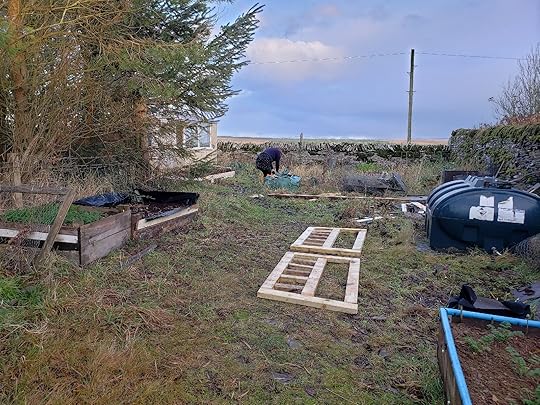
4: And finally, Sundays wouldn't be right if we didn't have some time sitting together to relax. This picture captured a moment earlier during the France-Poland match.
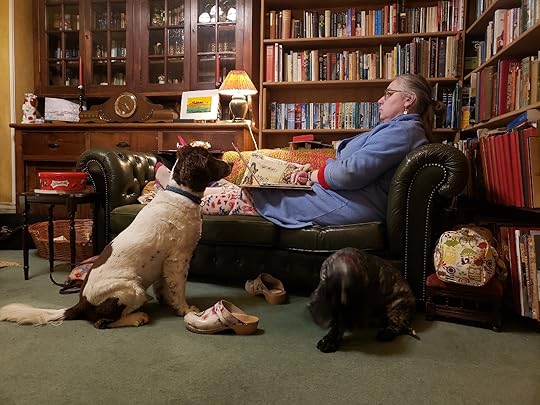
December 3, 2022
3rd December: Christmas in the Community
3 Moments from 3rd December
1) When walking the dogs this morning, Jess came nose-to-nose with a hare. Fortunately, there was a fence in between and the hare took off along the field. When we were coming back, there was another in a different field. It reminded me how wonderful it is to live here!
2) We went to the Lieurary Christmas Party today and it was such a joy-filled event, we loved every minute. My favourite moment was when Santa came over and presented Dad with a hamper.
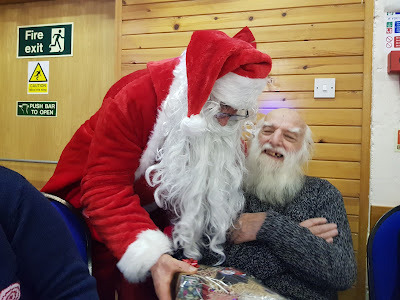
3) We have a dog advent calendar which Orlando has to share this year as we got a little bundle of craziness in Spring. Here they are doing synchronised cuteness while trying to get more treats - they don't understand how an advent calendar works.
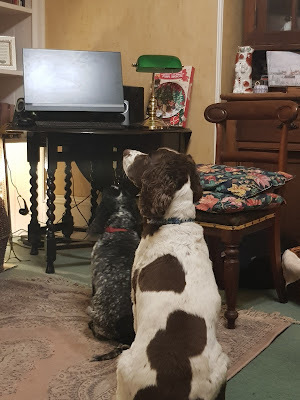
December 2, 2022
2nd December: Shopping and Books
One: rushing around on errands in town! Everyone, even those who are darting from place to place, can't help but feel Christmassy.
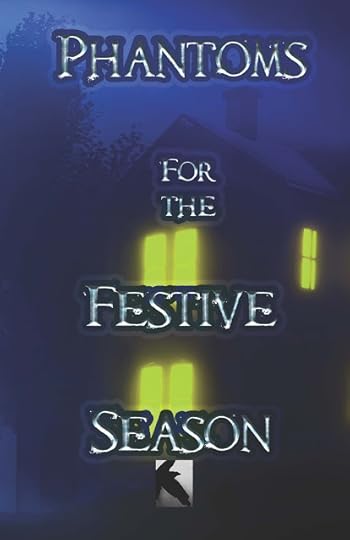
Two: our 6th Christmas Ghost Story anthology launched today - spooky tales in all shapes and sizes!
December 1, 2022
What Crowvus Did - Culloden Christmas Fair
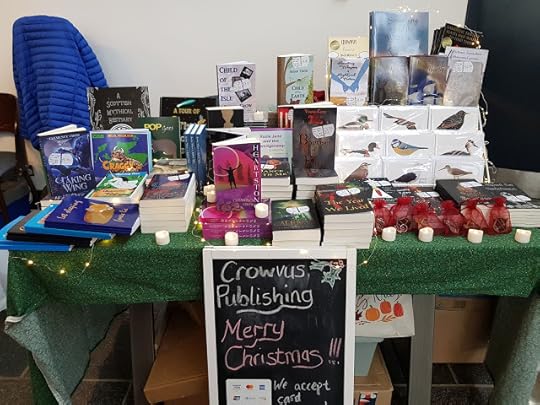
Coming home on Sunday night, there were – as Virginia put it – strange things in the sky. Heading over the Causeymire (known as the A9 to visitors!), we caught sight of one of the tell-tale signs of the Northern Lights: a spotlight which beams downwards instead of up from Earth. Unless there were UFOs in the area, it was a pretty sound Aurora Sighting. Aurora Watch also registered an Amber Alert at that time, which provided reassurance that we could trust our instincts.
The Merry Dancers were not the only strange thing happening in the sky either. As we passed through the Causeymire Windfarm, we saw a broad, golden light shoot through the sky – far larger than any shooting star I’ve ever seen. Perhaps, on this occasion, it was a piece of space debris falling to earth nearby: that would explain the strength of the light we saw. As thoughts turn towards Christmas, these phenomena put you in mind of all those angels in the sky above the shepherds. When my very matter-of-fact Dad first saw Northern Lights, he described how they immediately made him think of angels.
The Nativity played a wonderful part of our weekend. While visiting our sister’s family home on Saturday evening, we were treated to a wonderful retelling of the Christmas Story: our niece performing her entire Nursery play, complete with a track load of songs. Every verse was sung, and most lines were shared. In the final performance, her real line will be, “I bring you gold” as she’s playing one of the kings. She is clearly chuffed with this casting.
Earlier that evening, we’d had a sort-of-more-grown-up outing: the three of us and our sister – a pre-baby treat, as Lydia is now so big that the new baby looks ready to make an appearance at any moment. Everything from standing too long in line, to eating a spicy pizza, to her pulling open the door made us think that something could have been triggered. But her first baby didn’t make an appearance until the very last minute of her due date, so perhaps we shouldn’t be expecting any earlier this time.
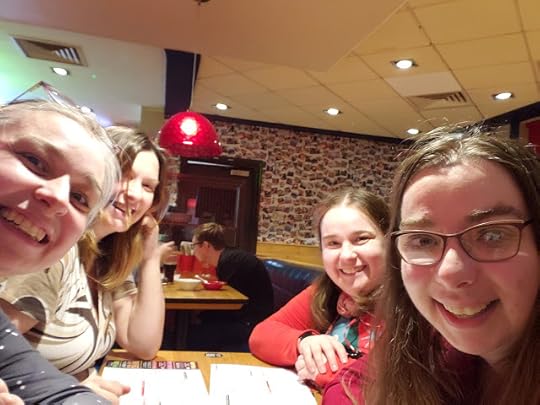
It was a wonderful magic to spend time together – the four of us. It’s an unusual combo these days, as there’s usually Lydia’s husband and daughter too, or Mum and Dad, and any mixture of the three dogs we have between us. And I wouldn’t swap all those wonderful, busy gatherings for anything, but it was still lovely to spend the evening with just the four of us. Mum’s “Little Women”. In what feels like a previous life sometimes, we all used to sing and perform together. Tight, neat harmonies which were worked out carefully by Lydia and then practised meticulously until they were absolutely spot-on. Nothing less was acceptable. “I didn’t realise you were like the Von Trapp family!” I remember my college crush saying to me once after we’d given a performance at the local Festival.
There was no singing on Saturday night, but there was a lot of hilarity and, in that laughter, there’s plenty of music. We found everything funny: Lydia is a bright, extremely intelligent, and organised professional woman but, at nine months pregnant now, there are hysterical moments of baby brain. She suggested I give my surname at Pizza Hut to make the booking, before realising that our surnames are still the same. But she wasn’t the only one who didn’t know how to use the drinks machine: Clemency also had a lot of accidental fun choosing random flavours for people’s drinks, and fortunately they all liked vanilla!
It was the perfect way to end such a busy day, and another hectic day of sales greeted us on the Sunday too. Culloden Moor is a name which strikes a note of despair in many hearts – my own included – and the first time we visited in 2009, we didn’t even get out the car as the sense of devastation and loss hits you like a blow to the chest. It isn’t only the loss of the Jacobite cause (which would have been my cause if I’d been around at the time), it’s the knowledge of everything which followed as a result. Without Culloden, there would have been no Clearances and no mass emigration, the results of which are still felt keenly in Scotland’s more rural areas today.
I returned to the battlefield in 2012, for the Memorial Service on the anniversary of the battle, which seemed like an appropriate reason to get out of the car. On Sunday, I walked up to the big cairn twice, trudging over the mass graves of so many highland soldiers who gave their lives to a cause they believed in, but one which was already close to being lost even before the battle. On our wander back up to the Visitor Centre, Clemency and I discussed how the Jacobite leadership had all but given up on the hope of winning by the time Culloden happened, with everything consistently stacked against them and internal bickering colouring the top ranks of the Jacobite army.
I remain unshakeable in my conviction that, had they continued on from Derby the previous winter, the Jacobites would have taken London, and the architecture of British – and world – history would look very different.
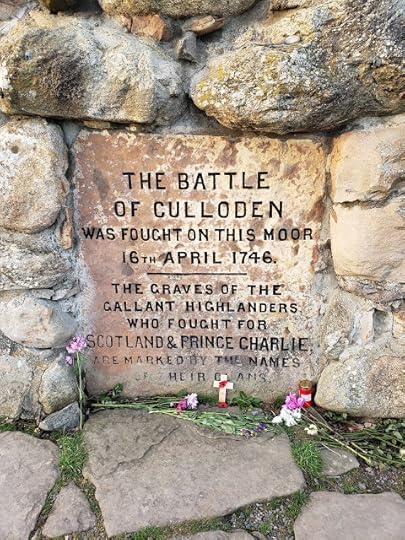
Still, that is the life never lived. Every moment of every day could be filled with “what ifs” if we let it be. At the start of the market on the Saturday morning, we asked ourselves repeatedly whether we would make any sales at all and wondered if the whole exercise was going to be a pointless waste of money. It became evident very soon that it couldn’t be defined as that: our fellow stallholders provided a treasure-trove of unique gifts for people to open on Christmas morning, and there are several now sitting in my bedroom, waiting to be wrapped up.
For our part, we began to make sales later in the morning and, by afternoon, we had more than paid back the cost of the stall for the weekend. Everything we made on the second day was a profit, and we also got the wonderful satisfaction of engaging with readers about our books. First question is always, “Are you a keen reader?” Followed by, “Well, if you can tell me any genre you prefer, I will do my best to match you up with a book.”
That’s something we take a great pride in: the eclectic nature of our book collection. We have everything from picture books to memoirs, through middle grade, kids’ non-fiction, young adult, and virtually every genre of adult fiction apart from scifi and romance. Even with those two genres somewhat lacking from the catalogue, we can point people in the direction of something which might well fit the bill. Many people bought a book, some people commented on just how many different books there were on our stall, and only one person said, “I love to read but I don’t like books like that.”
It's quotes like this which make me smile wryly. If you take part in these markets, you psych yourself up to know you’re not going to make a sale to every person. Sometimes, you have a great conversation with someone and think they’re about to buy a book but then, at the last minute, they change their mind. This is just the way of how these things go, especially at the moment with people feeling the pinch more than they have in a generation. All you can hope is that they’ve felt the benefit of that conversation as much as you – the seller – have done. And perhaps that – when circumstances are kinder to them – they may consider purchasing a book.
But, like the lady who vocally doesn’t like any of the books we have on offer, there are one or two other things which set my teeth on edge. The main one is adults who pull children past the stall, while the little ones gaze, wide-eyed at the literary feast in front of them. This happened a couple of times this weekend, and it has happened at virtually every event we’ve been a part of. Again, we understand that money is tight, but we always say our display copies are for reading so, if your child is interested, leap on that and take them through one of the books. A magic moment this weekend was a granny reading Craggy the Coo to her granddaughter while they stood at the stall. No sale was made, but the child’s interest in reading was given much needed nourishment by granny’s support.

Other personal favourite moments of the weekend (sales-wise) included a lovely couple who came around to the stall just before lunch. I’d just noticed that Costa Rica had secured their surprise victory over Japan, and I shared this enthusiastically with the man, while his wife shared knowing and long-suffering looks and comments with Clemency. These non-football types just don’t get the excitement we feel when there’s a surprise result (providing it’s not our teams who are suffering the surprise defeat!) At the end of the conversation, they left, assuring us that they’d be back to buy a book later. And, Dear Reader, they did come back to buy a book, which made my day!
Another moment which I will treasure was when I took my niece to buy a present in Inverness, having been collected by her and my brother-in-law at lunchtime on Saturday. I asked her whether she would like a toy or some clothes and, instead, she marched up to the book section of The Works and started selecting ten different picture books, for the bargainous total price of £10. These prices aren’t available to many retailers, and I suppose they must make authors and publishers cringe to see their books being sold for a pittance, but it’s hard to begrudge them when they’re fostering a love of reading in little ones.
It's that love of reading which underpinned the event at Culloden for me. And, beyond that, it was the love that every person had there for what they were doing. Fabulous artisan craftspeople were utterly inspiring, and I didn’t hear anyone complaining about anything. It certainly felt that the people of the Highlands had enjoyed the last laugh at Culloden: they lived and loved there, celebrating their cultural heritage and their future in a way which would have seemed impossible in 1746.
1st December: "Magic Moments" begin
Today, the moment was definitely putting up the crib - always a wonderful time in the year!
It was right at the end of the night - and was very useful for cheering us up after Germany🇩🇪 got knocked out the World Cup!
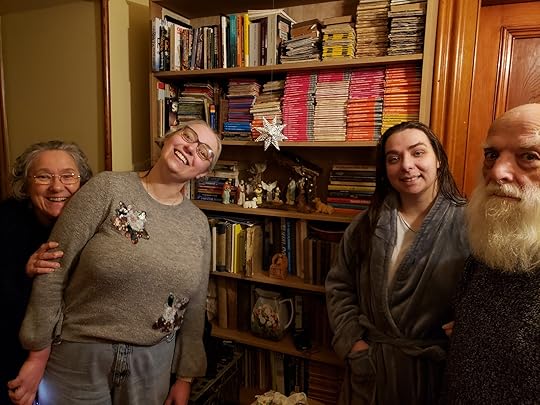
November 30, 2022
#HistFicThursdays - Her Castilian Heart - Anna Belfrage - Guest Post
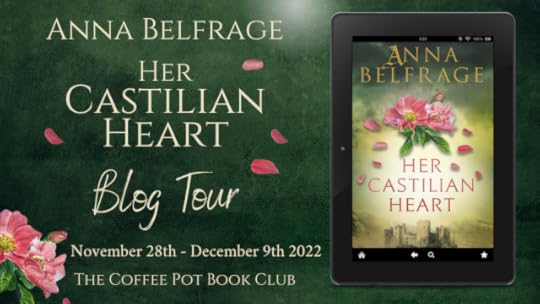
For this week's #HistFicThursdays blog, I'm delighted to be sharing the brilliant book Her Castilian Heart from Anna Belfrage, as part of her Coffee Pot Book Club tour. Read on for Anna's guest post about the cunning marriages of people and countries across 13th Century. But first, let's meet the book..
Blurb
Blood is not always thicker than water…
At times a common bloodline is something of a curse—or so Robert FitzStephan discovers when he realises his half-brother, Eustace de Lamont, wants to kill him.
A murderous and greedy brother isn’t Robert’s only challenge. He and his wife, Noor, also have to handle their infected relationship with a mightily displeased Queen Eleanor—all because of their mysterious little foundling whom they refuse to abandon or allow the queen to lock away.
Eustace is persistent. When Robert’s life hangs in the balance, it falls to Noor to do whatever it takes to rip them free from the toothy jaws of fate. Noor may be a woman, but weak she is not, and in her chest beats a heart as brave and ferocious as that of a lioness. But will her courage be enough to see them safe?
Trigger Warnings:There is some sexual (consensual) content. Also some violence
Her Castilian Heart is available via this Universal Link
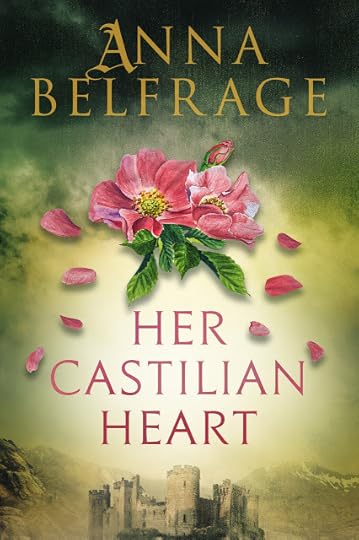
Guest Post
A father must do what a father can do to see his baby girl wed!
In my recent release, Her Castilian Heart, the adventures and misfortunes that beset my fictional protagonists, Robert FitzStephan and his wife Noor, are set against the backdrop of Edward I’s attempts to broker peace between the pope, the king of France and the king of Aragon.
I must admit that I was very intrigued when I started reading up on Edward’s mediating efforts. After all, how often do we think of Edward as some sort of peace dove? This is a man who comes down to us through history as a harsh man more given to martial pursuits than faffing about with an olive branch, so one wonders why he would expend so much time and money on what would, ultimately, prove a futile effort.
Maybe we should start with some background: In 1282, the Sicilians rose in rebellion against Charles d’Anjou, sick and tired of his oppressive taxation. To their rescue came Pedro of Aragon, who, through his wife, Constanza, had a claim on the kingdom of Sicily. In fact, Charles d’Anjou had brutally ripped Sicily out of Constanza’s father’s hand fifteen years or so earlier. (And yes, the entire Sicilian situation has become something of a rabbit hole for me, despite being tangential to my book 😊)
The papacy backed Charles d’Anjou in 1266 and was amply rewarded with annual tribute. Having this source of income ripped away in 1282 did not please the pope. Accordingly, King Pedro was excommunicated. As an aside, those medieval popes seem to have expended way too much time on their temporal powers than on their spiritual obligations, but even if I suspect King Pedro agrees with me here, being excommunicated in the thirteenth century was not good. Hell, dear peeps, yawned wide at the feet of those excluded from the Church, and no one wanted to spend eternity being roasted over hellfire.
Back to our story: In France, Charles d’Anjou’s nephew, Philippe III was furious on behalf of his uncle. Plus, he didn’t like, how Pedro of Aragon effectively controlled the western part of the Mediterranean. Which is why, cheered on by the pope, Philippe organised a crusade and invaded Aragon. Yes, a crusade, despite this being one Christian king leading an invasion into a Christian kingdom.
Anyway: the crusading French suffered a humiliating defeat in Aragon. Some weeks later, both Philippe III and Pedro II were dead.
We’re now in 1286, and Edward is given the task to somehow negotiate a treaty between the aggrieved pope, Philippe IV and the young Aragonese king, Alfonso.
Not an easy task, let me tell you. The pope wanted Sicily back under his indirect control, i.e. returned to the Angevins. Philippe wanted restitution for the loss of the crown of Aragon—rather odd, seeing as Aragon wasn’t his to begin with. Young Alfonso wanted peace—but not at the expense of relinquishing Sicily.
And then, of course, there was the matter of Eleanor, Edward’s daughter who was contracted to Alfonso. Eleanor was Edward and his wife’s eldest surviving child and she’d been contracted to marry Alfonso of Aragon for years. Pedro had requested repeatedly that she be sent down to Aragon to be raised at their court, but with the escalating conflict between the pope and the king of Aragon, Edward had found it wise to keep Eleanor at home. But now his daughter was seventeen, and Papa wanted to see his daughter safely wed.
This was Edward’s personal reason for sticking his foot into what effectively was a political hornet’s nest. He really wanted his daughter to become queen, but the pope had made it very clear he’d bring down the wrath of God on Edward, his wife and daughter if she wed that perfidious whelp before Sicily was returned to its rightful lord.
Edward spent three years negotiating. His expenses were huge—so huge he had to coerce “his” Gascon Jews to pay up 20 000 marks—and he returned to England in late 1289 heavily in debt. And without having managed to marry his daughter, as neither of the two treaties he managed to negotiate between France, the Angevins and Aragon actually called for the return of Sicily to Charles d’Anjou (By this time, Charles was dead, his heir was Alfonso’s prisoner which made the Angevin position vulnerable)
It took until 1290 until Edward finally began preparations for his daughter’s trip to Barcelona. In August of 1290, Eleanor wed Alfonso by proxy, and I imagine Edward was pleased: finally, his baby girl was on her way to become queen. But late in 1290, Edward’s beloved wife, Eleanor of Castile died. That obviously delayed things. And then, in 1291, Alfonso died. Eleanor, princess of England would never set foot in Barcelona, never speak her vows to Alfonso in person or become reigning queen, no matter how much time and silver her dear Papa had invested in trying to make it happen.
Now, let's meet the author:
 Had Anna been allowed to choose, she’d have become a time-traveller. As this was impossible, she became a financial professional with two absorbing interests: history and writing. Anna has authored the acclaimed time travelling series
The Graham Saga
, set in 17th century Scotland and Maryland, as well as the equally acclaimed medieval series
The King’s Greatest Enemy
which is set in 14th century England.
Had Anna been allowed to choose, she’d have become a time-traveller. As this was impossible, she became a financial professional with two absorbing interests: history and writing. Anna has authored the acclaimed time travelling series
The Graham Saga
, set in 17th century Scotland and Maryland, as well as the equally acclaimed medieval series
The King’s Greatest Enemy
which is set in 14th century England. Anna has also published The Wanderer , a fast-paced contemporary romantic suspense trilogy with paranormal and time-slip ingredients.
Her Castilian Heart is the third in her “Castilian” series, a stand-alone sequel to her September 2020 release, His Castilian Hawk. Set against the complications of Edward I’s invasion of Wales, His Castilian Hawk is a story of loyalty, integrity—and love. In the second instalment, The Castilian Pomegranate, we travel with the protagonists to the complex political world of medieval Spain. This latest release finds our protagonists back in England—not necessarily any safer than the wilds of Spain!
Anna has also authored The Whirlpools of Time in which she returns to the world of time travel. Join Duncan and the somewhat reluctant time-traveller Erin on their adventures through the Scottish Highlands just as the first Jacobite rebellion is about to explode!
All of Anna’s books have been awarded the IndieBRAG Medallion, she has several Historical Novel Society Editor’s Choices, and one of her books won the HNS Indie Award in 2015. She is also the proud recipient of various Reader’s Favorite medals as well as having won various Gold, Silver and Bronze Coffee Pot Book Club awards.
Find out more about Anna, her books and enjoy her eclectic historical blog on her website, www.annabelfrage.com
You can follow Anna on these links:Website - Twitter - Facebook - BookBub - Instagram - Amazon Author Page - Goodreads
Keep up with the rest of the Her Castilian Heart tour stops by clicking on the banner below:
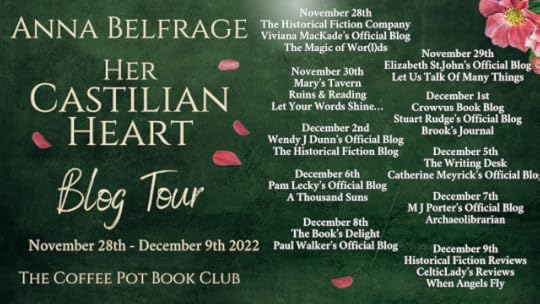
November 29, 2022
NaNoWriMo: How I Planned It - How I Wrote It
Well, I won NaNoWriMo, actually with three days still on the clock to complete. That means I’m being inventive with writing my words if I want to get all my badges and, in turn, that means that I’m getting this blog written. I’ve been meaning to write a NaNoWriMo blog all month (Virginia wrote one which is available here) but I’m only just getting round to it on 28th November.
I can’t share great words of wisdom, because I’m not a great researcher like Ginny is, but I can tell you that this is the first time I have ever – ever, mark you – completely pantsed a novel. Here’s how it happened…
Before NaNoWriMo comes Preptober, and I took it seriously this year. I came up with this idea of “Me: A 50 Piece Jigsaw”. This would be the story of a girl whose dad dies and so she joins the circus (or, more precisely, the fairground) whilst realising that she’s actually psychic. Oh, and there’s this villainous doctor in the shadows who is trying to “cure” people of psychic-ness and her friends with the same gifts keep disappearing.
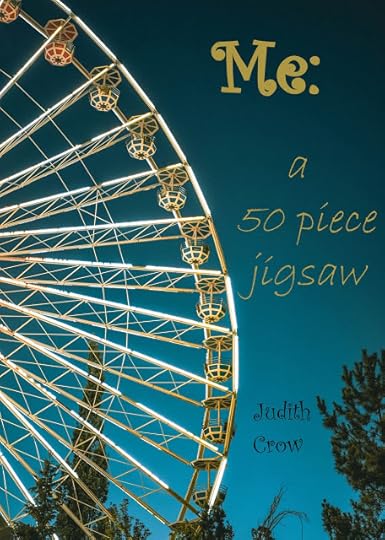
I actually think it sounds moderately convincing. I assigned it an exercise book and planned each one of the fifty chapters, each one with a different story or focus. Her dreams played a big part in it, as did her budding friendship with a fellow psychic who takes her under her wing.
By 31st October, I was set and ready to go. The only problem was, as 1st November dawned, I was really dreading writing this book. The characters were all two-dimensional in my head, and the plot – which had initially been promising – had never progressed into being something which could excite me. I had the working day (1st November was a Tuesday) to come up with a plan and, by the end of the day, I had this sort-of-idea about someone who can see dead people.
Yes, I would describe the book I wrote in the end as The Sixth Sense meets Jacqueline Wilson – which I think is a reasonably bizarre combination. The spark of the idea was that this person (who I named Sam because I didn’t know initially what gender they were) could see ghosts, and it was making things really difficult at home. Not that home’s all that easy anyway, because her parents separated a year ago and now she’s finding her way around a broken home.
Of course, my worldbuilding is very important to me, and I love tying things in to my other books. Cue one of the main characters: Broughley Abbey – the stately home at the edge of the Lincolnshire Fens which I first introduced in The Devil’s Servant (short story published by Quill and Crow in Ravens and Roses), although the Duke of Broughley school was referenced in The Backwater. Broughley Abbey also features in my Histories trilogy and makes a fleeting appearance in the third instalment of The Rite Way, but these have yet to be shared with the wider world.
As I continued to write, I started to get to know the characters. Some of them remained a little 2D (but, hey! it's a first draft, so you have to cut me some slack!) but others grew into well-rounded and complex individuals. Finally, I added in the stranger with the chocolate-coloured eyes, and he brought things together very nicely for me, but I will admit that it was a surprise to me as well as Sam when he turned up!
By nature I’m a plantser (I had even awarded myself the Plantser badge before NaNoWriMo even began) but I can’t say I disliked having to pants this novel. It taught me a lot about me as a writer, not least that I don’t have to have* an exercise book for every project just to see it through from beginning to end!
*I’m likely to still have an exercise book wherever possible because, let’s face it, they’re an awesome instrument in the writer’s toolbox!
November 24, 2022
#HistFicThursdays - Horrible Histories 11 - It's a New World Song - HAPPY THANKSGIVING!
Being on this side of the pond, Thanksgiving Day was something which marked the start of the American Christmas in books and films. It wasn't until much later that I found out the background and, even now, I'm pretty sure I don't know it half as well as my Stateside friends.
The history of Thanksgiving, from a writer's point of view, is an absolute gift. Why? Because it encapsulates all the human emotions which combine to turn humans into people - or, in writer-speak: words into characters. It's one of those situations into which you can drop any one of your characters and use it to solidify your knowledge of them. Would they have been a native or an immigrant? Would they have been afraid, excited, or angry? According to the song, the immigrants shot at the natives to frighten them off, but did they do that because of a fear or an arrogance? Would they have survived in that environment?
And then, the best thing of all: the discovery that, just because a character started in one camp, it doesn't mean they will remain there. Just like the immigrants in 1620/21, they can come to better understand other people and situations, advancing and growing into three-dimensional people. This is what is called a character arc, and it is what we all do in real life, so our characters should do the same.
The story of Thanksgiving is really a redemption story. Two populations realising that they can demonstrate true humanity in working together rather than against one another. In this respect, it doesn't matter what genre you write. There is an example here in historical fiction, but in today's world people still create frictions between groups of people and, sadly, I suspect this will go on into the future.
But what the history of Thanksgiving really shows is that humanity has the ability to reach out to one another with fraternal love. So don't listen if people say your story or characters are far-fetched just because the heroes demonstrate this level of compassion and care. Because, the history of Thanksgiving shows us it in action. I love building my stories on the premise of Φιλαδελφία - brotherly love - which translates into the Latin alphabet as Philadelphia...
...that name sounds familiar!
[Although Philadelphia was founded 60 years later, so a few generations down the line.]
Happy Thanksgiving!
November 18, 2022
Weaving History into Fantasy - A @WeeklyScribe Guest Post
This week's curator on the @WeeklyScribe account is E.L. Lyons (@Lyons_Pen), author of Starlight Jewel. Here is her writing advice on drawing from history to incorporate into fantasy...
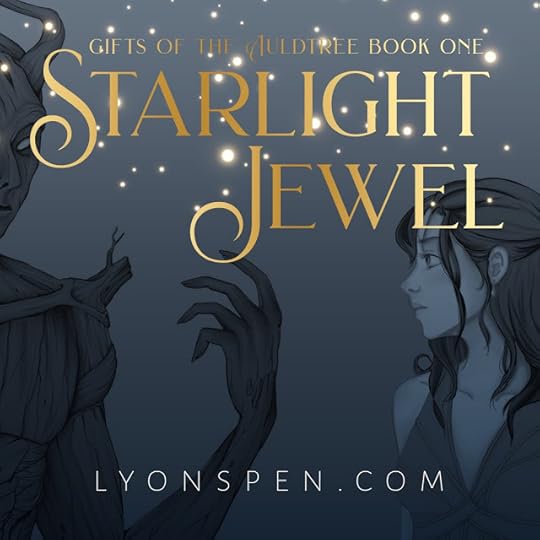
When writing fantasy, the magic system always seems to be at the forefront of attention. Wands and dragons and spells are exciting. But when writing epic fantasy, where you’re creating a whole world different from ours, history is essential to grounding that magic and those cultures to make them seem real. If the history doesn’t feel real, or the world seems like it’s just starting, it gives the entire environment an inauthentic feeling.
Contrast this with the terrible E word… Exposition. The one thing that no fantasy author wants to be accused of. You have to craft your world’s history, lace it with magic, and then you can’t even tell your reader about it. But you also have to make sure they know it’s there.
I’ve learned a lot of hard lessons about this delicate balance with Starlight Jewel. One reason it took me near two years to edit it, is because beta readers weren’t grasping my history. It was there, I had crafted it, I’d even woven it in delicately, but readers were confused about who exactly the “Ashites” were. They were the indigenous people of the country of Norge. Historically, they ruled a small portion of the country, then there was a little war, and the Norgans overthrew them, incorporating the Ashite lands as a part of their pre-existing larger nation. Some Ashites are still living in Norge, plotting to take back their country after a couple centuries of recuperating.
There. I explained it. Quick and easy right? But it’s exposition. Even if it’s not a huge chunk of exposition, the main problem with the terrible E, is that it isn’t memorable. Readers will forget the history if you tell them. If not in the next three pages, they’ll forget it three chapters. If I say something once in a 494-page book, it’s just going to get lost in a sea of words.
So how do you weave in history? I ended up doing it in a lot of small ways—characters talking at the gravesite of a king, books from historical peoples, a painting of a general from an old war, references to what certain buildings or rooms had been used for in previous societies, artifacts, and referencing past events in comparison to current ones. But these can’t just be random snippets, they have to be relevant to the plot and characters. They also have to string together a clear and coherent history that’s interesting, which often means condensing the historical events/people/culture into something a little more tightly connected that real history.
If you can manage this, then your world’s history will be more memorable and engaging. I’m certainly no Tolkien, but if the difference in understanding and reaction from my first round of beta readers to my last round of beta readers is to be believed, I did good sneaking the history in.Starlight Jewel
Crowvus Book Blog
- Virginia Crow's profile
- 128 followers



